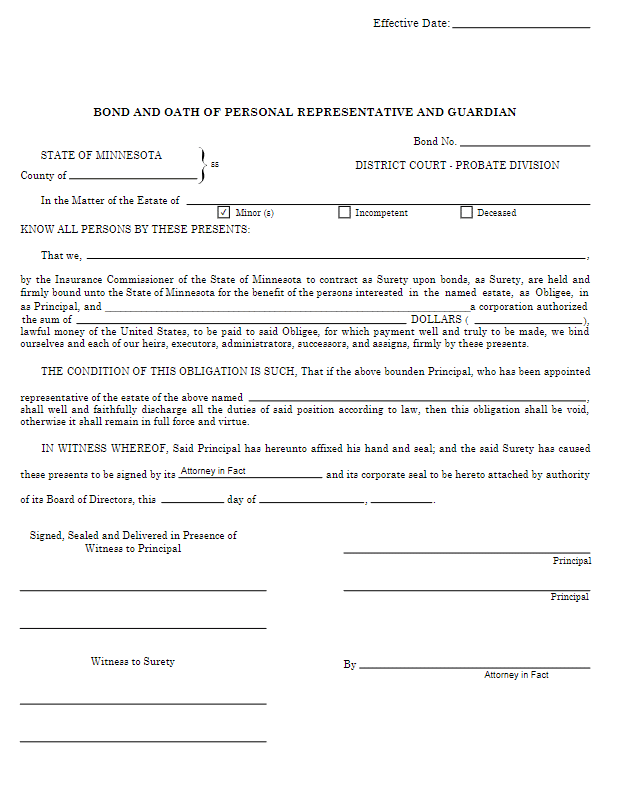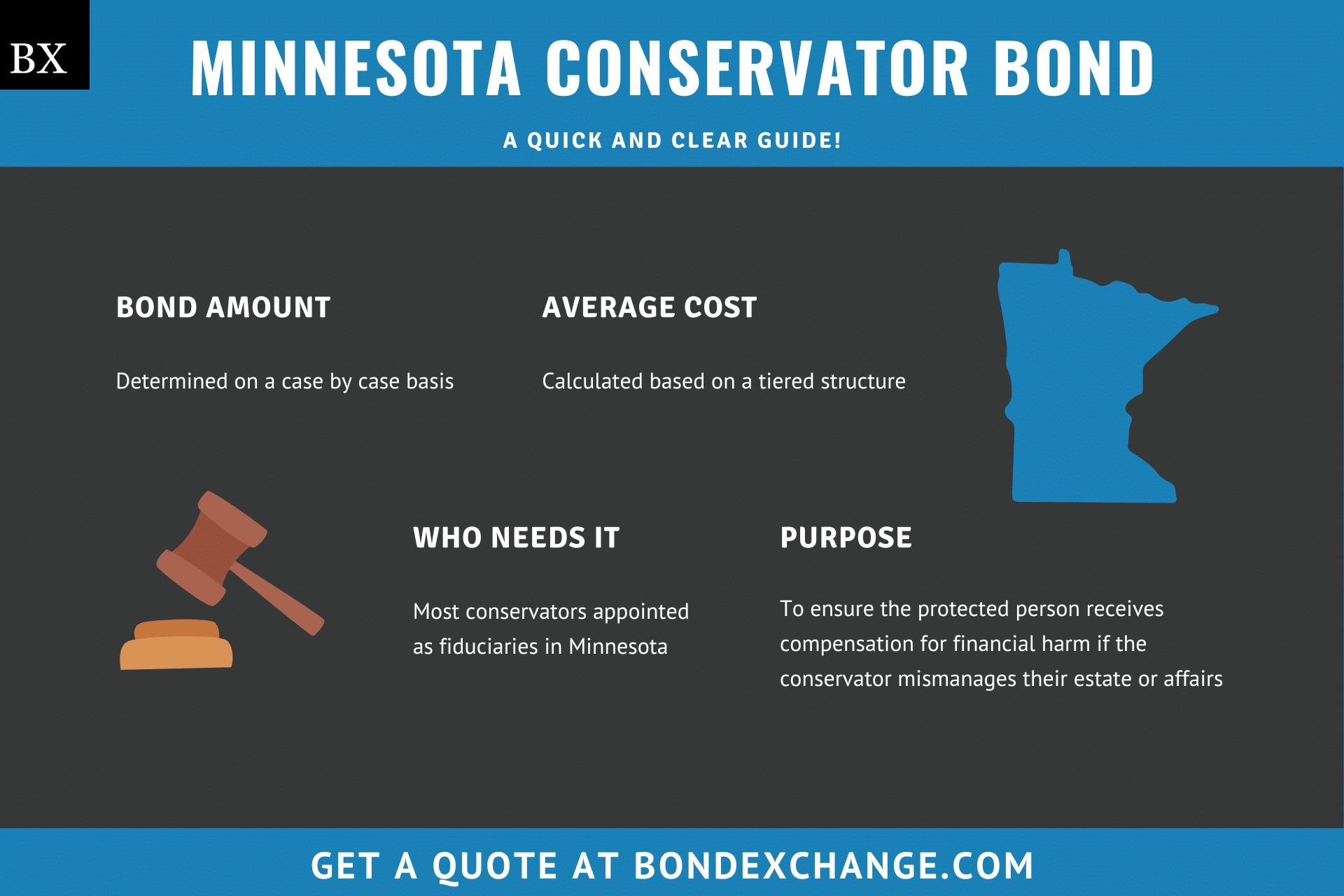Minnesota Conservator Bond: A Comprehensive Guide
This guide provides information for insurance agents to help their customers obtain a Minnesota Conservator bond.
At a Glance:
- Average Cost: Calculated based on a tiered structure
- Bond Amount: Determined on a case-by-case basis (more on this later)
- Who Needs It: Most conservators appointed as fiduciaries in Minnesota
- Purpose: To ensure the protected person receives compensation for financial harm if the conservator mismanages their estate or financial affairs
- Who Regulates Conservator Bonds in Minnesota: The probate division of the district court with jurisdiction over where the protected person resides

Background
Minnesota Statute 524.5-401 requires all conservators to be appointed by a court before assuming their fiduciary duties. The Minnesota legislature enacted the appointment requirement to ensure conservators act in the protected person’s best interests when managing their estate and financial affairs. To provide financial security for the enforcement of this requirement, most conservators must purchase and maintain a probate surety bond before becoming appointed as a fiduciary.
What is the Purpose of the Minnesota Conservator Bond?
Minnesota requires most conservators to purchase a surety bond as a prerequisite to being appointed as a fiduciary over a protected person’s estate and financial affairs. The bond ensures that the protected person and all persons interested in their estate will receive compensation for financial harm if the conservator fails to abide by the regulations outlined in Minnesota Statutes 524.5-415 and 524.5-416. Specifically, the bond protects the individual if the conservator fails to adhere to all court orders or mismanages the estate’s assets.
For example, if a conservator uses money from the protected person’s bank account to pay for unauthorized expenses or mixes the estate’s funds with their own, the protected person can file a claim against the conservator’s bond to recoup their losses. In short, the bond is a type of insurance in favor of the protected person if the conservator does not fulfill their fiduciary duties.
How Can an Insurance Agent Obtain a Minnesota Conservator Bond?
BondExchange makes obtaining a Minnesota Conservator bond easy. Simply log-in to your account and use our keyword search to find the “Conservator” bond in our database. Don’t have a login? Gain access now and let us help you satisfy your customers’ needs. Our friendly underwriting staff is available by phone (800) 438-1162, email or chat from 7:30 AM to 7:00 PM EST to assist you.
At BondExchange, our 40 years of experience, leading technology, and access to markets ensures that we have the knowledge and resources to provide your clients with fast and friendly service whether obtaining quotes or issuing bonds.
Not an agent? Then let us pair you with one!

Click the above image to find a BX Agent near you
How is the Bond Amount Determined?
Minnesota Statute 524.5-416 and Minnesota Court Rule 416 grant the court the authority to set the required bond amount on a case-by-case basis. When determining the required amount, the court will consider factors such as the value of the protected person’s estate, the income it is expected to generate, and the qualifications of the conservator.
If the protected person receives funds from the Department of Veterans Affairs (VA), the conservator may be required to obtain two separate bonds. Conservators may petition the court to lower the required bond amount to offset premium fees.
Can the Bond Amount be Adjusted?
Yes, as Minnesota Court Rule 416d grants the court the authority to adjust the required bond amount at any time during the conservatorship. Minnesota Statute 524.5-414 also allows for the protected person or any person interested in their estate to petition the court to adjust the required bond amount or require an additional bond.
What are the Underwriting Requirements for the Minnesota Conservator Bond?
Most surety companies will examine the following factors when determining eligibility for the Minnesota Conservator bond:
- Conservator’s credit history
- Whether or not the estate has an attorney
- Whether or not the conservator is a family member
- The conservator’s occupation
- Whether or not the conservator is replacing a prior fiduciary
- If the conservator has ever committed a felony
- Whether or not there is any ongoing business in the estate
- If a creditor is requiring the bond
- If the bond amount is greater than or equal to the estate’s value
How Much Does the Minnesota Conservator Bond Cost?
Surety companies typically determine the premium rate for Conservator bonds based on a tiered structure, so larger bond amounts will be charged a lower premium rate than smaller bonds.
The following table illustrates the pricing structure for the Minnesota Conservator bond:
$1,500,000 Conservator Bond Cost
| Bond Amount | Premium Rate | Total Bond Cost |
|---|---|---|
| First $20,000 | 0.75% | $150 |
| Next $40,000 | 0.60% | $240 |
| Next $140,000 | 0.50% | $700 |
| Next $300,000 | 0.375% | $1,125 |
| Next $1,000,000 | 0.25% | $2,500 |
| Total cost of $4,715 |
Who is Required to Purchase the Bond?
Minnesota requires most conservators to purchase a surety bond as a prerequisite to becoming a court-appointed fiduciary. To paraphrase Minnesota Statute 524.5-102, a “conservator” is an individual or organization appointed as a fiduciary to manage and make financial decisions for a person’s estate and/or financial affairs. Likewise, a “protected person” is a minor or incapacitated adult for whom a conservator has already been appointed and a “respondent” is a minor or incapacitated adult for whom a petition for conservatorship has been filed.
Conservators are not required to purchase a surety bond, unless explicitly required by the court, in the following situations:
- The personal property of the protected person’s estate is worth less than $10,000
- The conservator is a bank or trust company provided that the total assets under the conservator’s control are worth less than $1,000,000
- The conservator deposits a portion of the estate’s assets which can not be withdrawn without a court order provided that the remaining assets under the conservator’s control are worth less than $10,000

How do Minnesota Conservators Become Appointed as Fiduciaries?
Conservators in Minnesota must navigate several steps to become appointed as fiduciaries. Below are the general guidelines, but appointees should refer to the state’s probate code or the Minnesota Court’s website for details on the process.
Step 1 – Hire an Attorney
Although not explicitly required, it is highly recommended that conservators hire an attorney to assist with the conservatorship process.
Step 2 – Determine Priority
Priority to serve as a conservator is granted in the following order:
-
- Persons already appointed as a fiduciary over the respondent in another jurisdiction
- An individual or corporation nominated by the respondent if the respondent is at least 14 years old and has sufficient capacity to express a preference
- An agent appointed by the respondent to manage their property under a durable power of attorney
- The spouse of the respondent or their nominee
- The adult child of the respondent or their nominee
- The parent of the respondent or their nominee
- An adult who has resided with the respondent has resided for at least six months
- An adult who is related to the respondent by blood, adoption, or marriage
- Any other adult or professional conservator
The court will appoint the conservator best suited for the individual and may choose to appoint a person with lower priority or without priority. Persons are ineligible for appointment as a conservator if they are a person that provides paid services to the respondent unless they are related to the respondent by blood, marriage, or adoption.
Step 3 – File a Petition for Appointment
Persons seeking a conservatorship over a minor or incapacitated adult must file a petition for appointment with the probate division of the district court with jurisdiction over where the respondent resides. Petitioners can obtain the necessary forms online here or from the court, and must ensure they complete the form in its entirety to avoid delays in the proceedings.
The respondent or any person interested in the respondent’s estate, financial affairs, or welfare may petition the court to begin a conservatorship. All forms should be filed with the court administrator once complete, and there is a filing fee that varies from county to county.
Step 4 – Notify the Appropriate Parties
After submitting the required items to the court, petitioners must notify all of the interested persons listed in the petition. The notice must include a notice of the hearing and a copy of the petition and must be given to all of the following parties listed in the initial petition for appointment. The court will appoint a visitor to visit the respondent and personally serve notice of the hearing to them.
Step 5 – Attend a Hearing
Conservators must attend a hearing conducted by the court and present evidence as to why the respondent is in need of conservatorship. The court will examine the evidence presented by the conservator as well as that presented by the individual being evaluated (if any) and make a determination as to whether or not conservatorship is necessary.
Any interested person can apply to the court to participate in the hearing. If the court finds a basis for the appointment, it will issue a letter of conservatorship to the petitioner.
Step 6 – Purchase a Surety Bond
Unless otherwise exempt, conservators must purchase and maintain a surety bond (limits outlined above).
How do Minnesota Conservators File Their Bonds?
Conservators should file their completed bond forms, including the power of attorney, to the probate division of the district court with jurisdiction over where the protected person resides.
The surety bond requires signatures, including witness signatures, from the surety company that issues the bond and the applicant. The surety company should include the following information on the bond form:
- Legal name of the entity/individual(s) buying the bond
- Legal name and county of the protected person
- Surety company’s legal name
- Type of fiduciary relationship
- Date the bond is signed
- Bond amount
What can Minnesota Conservators do to Avoid Claims Made Against Their Bonds?
To avoid claims against their bonds, conservators in Minnesota must ensure that they:
- Perform all of their fiduciary duties
- Obey all court orders
- Do not mismanage the estate’s property
- Obtain court approval before using any of the estate’s funds
